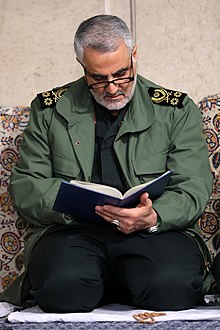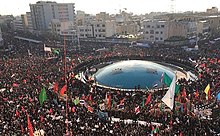Qasem Soleimani

Qasem Soleimani (Persian: قاسم سلیمانی, born 11 March 1957 - 3 January 2020) was an Armed Forces of the Islamic Republic of Iran military officer who served in the Islamic Revolutionary Guard Corps (IRGC). From 1998 until his assassination in 2020, he was the commander of the Quds Force, an IRGC division primarily responsible for extraterritorial and clandestine military operations. Soleimani was significantly involved in the build up the military capacity of Lebanon's Hezbollah, shaping the post-war political landscape in Iraq, and turning around the Syrian civil war. He was the director of the Iranians who assisted Americans in the initial phase of Afghanistan War through secret meetings with Ryan Crocker. In his later years, he was considered by some analysts to be the right-hand man of the Supreme Leader of Iran, Ali Khamenei, as well as the second-most powerful person in Iran behind him.
Quotes[edit]
- One type of paradise that is portrayed for mankind is streams, beautiful nymphs and greeneries. But there is another kind of paradise. ... The warfront was the lost paradise of the human beings, indeed.
- In a 2009 interview
- Quoted in "Soleimani, a General Who Became Iran Icon by Targeting US". The Associated Press
- Dear General Petraeus, you should know that I, Qassem Suleimani, control the policy for Iran with respect to Iraq, Lebanon, Gaza and Afghanistan. And indeed, the ambassador in Baghdad is a Quds Force member. The individual who’s going to replace him is a Quds Force member.
- In a text message conveyed by Iraqi President Jalal Talabani to CIA director David Petraeus
- Quoted in Dexter Filkins (30 September 2013). "The Shadow Commander". The New Yorker.
- We’re not like the Americans. We don’t abandon our friends.
- Attributed to him by a former Iraqi leader, referring to Syria.
- Quoted in Dexter Filkins (30 September 2013). "The Shadow Commander". The New Yorker.
- The Syrian Army is useless! Give me one brigade of the Basij, and I could conquer the whole country.
- Dexter Filkins (30 September 2013). "The Shadow Commander". The New Yorker.
- I entered the [Iran-Iraq] war on a fifteen-day mission, and ended up staying until the end. … We were all young and wanted to serve the revolution.
- Quoted in Dexter Filkins (30 September 2013). "The Shadow Commander". The New Yorker.
- When I see the children of the Martyrs, I want to smell their scent, and I lose myself.
- Quoted in Dexter Filkins (30 September 2013). "The Shadow Commander". The New Yorker.
Quotes about Qasem Soleimani[edit]




- The battle of Qusayr was a watershed moment: Hezbollah tipped the balance back in the regime’s favor. It would pour more and more men into the war, becoming a party to the conflict. The head of the IRGC’s al-Quds force, Qassem Suleimani, attended some of their funerals, as early as February 2013, when one of his comrades from the war against Saddam was among the first Iranians killed there. “Syria is the front line of the resistance. We will support Syria till the end,” Suleimani declared. For him, the Assad regime and Syria were part of his grand ambition to build his own borderless empire, just like Baghdadi, except this one would be loyal to the wilayat al-faqih. Iran was again pursuing “war, war until victory”—even if victory looked like devastation on someone else’s land. From Egypt to Saudi Arabia, clerics were incensed by Iran’s daring. So incensed that, for the first time, clerics preaching in the Holy Mosque in Mecca called on Sunni Muslims to help their Syrian brothers, by all means, including arms. As elite members of the Quds force and Hezbollah fighters fanned out across Syria, al-Nusra set up a shari’a court in Raqqa. They attacked other rebel groups. They assassinated FSA commanders. They berated women who didn’t veil. On the outskirts of Raqqa, men with black flags gathered, then streamed into the city in convoys of white pickup trucks. Throughout the summer, more men arrived, most of them Iraqis. They eliminated rivals from the FSA and other rebel groups. Slowly but ruthlessly, Baghdadi’s men seized control of Raqqa, even taking over most of al-Nusra. In April 2013, Baghdadi announced that a new organization was formed: the Islamic State in Iraq and Syria.
- Kim Ghattas, Black Wave: Saudi Arabia, Iran, and the Forty-Year Rivalry That Unraveled Culture, Religion, and Collective Memory in the Middle East (2020)
- This is a story we seldom hear: that despite the complexities of the US–Iran relationship, the fight against Islamic State was only won through the resistance led by Soleimani – who was successful where all other attempts – whether US or locally-led – failed.
- Massoud Shadjareh, Chair of Islamic Human Rights Commission (7 January 2020)
- https://www.euronews.com/2020/01/07/in-killing-soleimani-trump-s-only-success-is-the-uniting-of-a-once-divided-iran-view
- In his life, but even more so in his death, he has united Iran’s various political and religious groupings which, in contrast to the uniform way in which they are often presented in global media, are in fact split between countless political constituencies and alliances. ... the external threat of extrajudicial US acts in the region has united Iranians - in both the elite as well as on the street - like never before.
- Massoud Shadjareh, Chair of Islamic Human Rights Commission (7 January 2020)
- https://www.euronews.com/2020/01/07/in-killing-soleimani-trump-s-only-success-is-the-uniting-of-a-once-divided-iran-view
- Well, the first thing they’re lying about, as a military professional, I know cold. No general, especially not one at the level that Soleimani was operating — no general reaches out and kills someone. Nor does he reach out to a team and say, “Kill someone.” Nor does he reach out to a squad or a platoon or a company and say, “Kill someone.” He gives orders at the top, sets strategic purposes and principles and general guidelines, and he boosts morale, and he travels around, and he talks to the teams and so on — exactly what Soleimani was so good at.
So, to say that Soleimani, himself personally, was an imminent threat is, as I said before, laughable.
- We have just, as we did with torture from 2002 to 2007, 2008, as we substantiated for the world that torture was OK, we have now OK’d the killing of recognized members of other states’ government. That’s what Soleimani was, no matter how heinous we may paint him... We have become the law of the jungle, rather than, as we have been since 1945, the greatest supporter of international law and the rule of law in general across the face of the globe. With torture and with killing other state recognized individuals of their government, we have become the tiger, the lion, the bear, the alligator in that jungle. It’s not a very, very good precedent to have set, as the Russians indicated. The Chinese have said similar things. It’s a terrible precedent to have set.
- The shoe of Qasem Soleimani is worth the head of Trump and all American leaders.
- Sayyid Hassan Nasrallah, Secretary-General of Hezbollah (5 January 2020)
- https://time.com/5759060/hezbollah-lebanon-united-states-military/
- http://english.almanar.com.lb/906820
- General Soleimani was not just the commander of al-Quds military forces. Far more accurately he should be considered the number two figure of importance in the entire Iranian ruling structure, and perhaps the most popular political/military figure in Iran...His strategy, tactics and policies ran circles around the leaden and ill-conceived policies and leaders of the US war in Iraq—still ongoing 17 years later... The trembling puffery and outrage on the part of most politicians and commentators in the US that “Soleimani was responsible for the deaths of any number of American soldiers in Iraq” reflects either childish naivete or massive self-delusion... This latest act of “foreign policy by assassination” will be largely rejected by most in the world. Only a few craven Gulf kings and princes—and Israel—will applaud it...
- Graham E. Fuller in US Foreign Policy by Assassination, January 4, 2020
- Soleimani has taught us that death is the beginning of life, not the end of life.
- Anonymous Iraqi commander
- Quoted in https://www.euronews.com/2020/01/03/who-was-qassem-soleimani-the-assassinated-commander-of-iran-s-overseas-military-campaigns (3 January 2020)
- Suleimani is the single most powerful operative in the Middle East today … and no one’s ever heard of him.
- John Maguire, former CIA officer in Iraq
- Quoted in Dexter Filkins (30 September 2013). "The Shadow Commander". The New Yorker.
- Among spies in the West, he appears to exist in a special category, an enemy both hated and admired: a Middle Eastern equivalent of Karla, the elusive Soviet master spy in John le Carré’s novels.
- Dexter Filkins (30 September 2013). "The Shadow Commander". The New Yorker.
- The whole operation [of Al-Qusayr] was orchestrated by Suleimani. … It was a great victory for him.
- John Maguire, former CIA officer in Iraq
- Quoted in Dexter Filkins (30 September 2013). "The Shadow Commander". The New Yorker.
- He is so short, but he has this presence. … There will be ten people in a room, and when Suleimani walks in he doesn’t come and sit with you. He sits over there on the other side of room, by himself, in a very quiet way. Doesn’t speak, doesn’t comment, just sits and listens. And so of course everyone is thinking only about him.
- Former senior Iraqi official
- Quoted in Dexter Filkins (30 September 2013). "The Shadow Commander". The New Yorker.
- He has ties to every corner of the system. … He is what I call politically clever. He has a relationship with everyone.
- Meir Dagan, former head of Mossad
- Quoted in Dexter Filkins (30 September 2013). "The Shadow Commander". The New Yorker.
- All of the important people in Iraq go to see him. … People are mesmerised by him – they see him like an angel.
- Saleh al-Mutlaq
- Quoted in Martin Chulov (28 July 2011), "Qassem Suleimani: the Iranian general 'secretly running' Iraq", The Guardian.
- He is indeed like Keyser Söze. … Nobody knew who he was and this guy's the same. He is everywhere, but nowhere.
- A senior US official
- Quoted in Martin Chulov (28 July 2011), "Qassem Suleimani: the Iranian general 'secretly running' Iraq", The Guardian.
- … softly spoken and reasonable, very polite. … He is simple when you talk to him. You would not know how powerful he is without knowing his background. His power is absolute and no one can challenge this.
- A member of Iraqi parliament
- Quoted in Martin Chulov (28 July 2011), "Qassem Suleimani: the Iranian general 'secretly running' Iraq", The Guardian.
- He is the most powerful man in Iraq without question, ... Nothing gets done without him.
- Mowaffak al-Rubaie, July 2010.
- You are a living martyr.
- Khamenei, leader of Iran
- Quoted in http://www.khatteemam.ir/fa/?p=15258.

